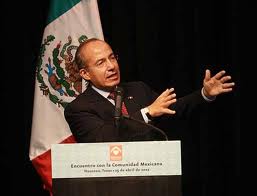 Felipe Calderon, President of Mexico
Felipe Calderon, President of Mexico
No one should envy the President of Mexico, Felipe Calderón, as he chairs a meeting of the G20, the world richest economies, in June. Delivering success for any group of countries is virtually impossible, and the outcomes that Calderón would like to achieve for developing countries look certain to be promises rather than action.
Undoubtedly, Calderón is sincere in his desire to be the developing countries’ advocate - an undertaking he gave to the 15-nation Caribbean Community countries and to the Alliance of the Pacific (Mexico, Colombia, Peru, Chile, and Panama as observer). But, while all appreciate his sincere intentions, few harbour any real hope of his success on their behalf. At the Pacific meeting, Colombia’s President, Juan Manuel Santos, told Calderón in frank terms: “If nothing changes radically, the G20 meeting will be another failure… to believe that the G20 will resolve our problems, well, I have a lot of doubts”.
Santos has good reason for doubts. As is usual, the G8 countries – the industrialised nations – met in advance of the G20 meeting. The G8 huddled at Camp David in the US under the Chairmanship of President Barack Obama. While the declaration from that meeting did not say so, the G8 would have co-ordinated their positions on issues likely to arise at the G20 Summit. Seven of the eight leaders (Russia excluded) may have different priorities and approaches but they are far more allied than other leaders in the G20. By the same token, the developing countries that are members of the G20 have not held a similar co-ordinating caucus.
What is certain is that, despite Calderón’s best efforts, the G20 meeting will be dominated by the Eurozone debt crisis in Europe. No more than platitudinous attention will be paid by the G8 leaders (whose economies represent more than half of the world’s GDP) to the disastrous effects of Climate Change on developing countries and on their increasing need for energy and food security, or, indeed, on their debt challenges. Already, promises of $22 billion in agricultural aid to poor countries, made by the G8 in 2009 for a three-year period, have not been kept. The donors have disbursed only 22 per cent of the amount.
On a global rise in temperature of 2°C - a threshold beyond which catastrophic climate change is likely to occur particularly for small island states – the G8 countries at their Camp David meeting did nothing to suggest that they plan to cut their own green-house gas emissions or help developing countries to meet the costs of mitigation. With China and India very likely to dig-in their own heels not to cut their industrialization plans, the G20 meeting offers zero prospect of any meaningful news on this front.
On the Eurozone crisis, the Camp David G8 meeting exposed that the leaders disagree on solutions. This led the former Prime Minister of Britain, Gordon Brown, to state publicly that: “The unpalatable truth is that European countries can no longer rescue themselves from stagnation without international support. What should have happened at the G8 – and what must happen at the G20 next month – is a coordinated global response that will help Europe decisively address the two elements of the crisis that are being ignored”. He identifies the two elements as “crisis in the fundamentals of its banking sector”, and “failure of economic growth and competitiveness that affects every country on the continent with the sole exception of Germany”.
What is worrying the Eurozone countries now – and is also worrying their big trading partners, the US, China and Britain – is not only the grave uncertainty over Greece (where a debt default has been averted for now) but also that Italy and Spain are on the edge of possible default on their debts. The Europeans have created a $981 billion bailout fund with a lending capacity of $622 billion. But that would be insufficient to deal with a collapse in Spain or Italy. As Brown said, Europe has to look to the wider international community for help.
Yilmaz Akyüz,Chief Economist at the South Centre points out: “This is the main reason for the recent initiative to double IMF resources”. But, if expanded IMF resources have to be used to help bail out Spain and Italy with France not far behind, needy developing countries will be crowded-out from access to emergency and last-resort funds should their own economies continue to slide.
Each country in the G20 has its own domestic interest in what happens in the Eurozone. The US administration is pushing for more spending and less austerity in Europe. As the Euro slides in value and European spending contracts, so rises the cost of US products, adversely affecting exports to Europe and jobs in the US. In 2011, China accounted for two-thirds of East Asia’s $592 billion worth of shipments to Europe. Now China is suffering from a decline in European purchases, intensifying the evident slowdown in its economy.
On this basis, the US and China will be as focussed at the G20 meeting on the Eurozone as will be the four European nations and the European Commission, all of whom are full members of the G20. The Communiqué of the meeting will, undoubtedly, mention global warming, food security and energy security, and promises will surely be made to deliver assistance. But, development issues will not even have the back seat at the meeting despite all the brave efforts of President Calderón.
While the developing world should be grateful for his labours, the available evidence suggests that small states especially should not hold their collective breath for this G20 meeting to make a meaningful difference to them. By the same token, developing countries, such as the Caribbean islands that are reliant on Europeans having enough money to travel for tourism, should also support initiatives from the G20 that help to stabilize the Eurozone economies, or their own conditions will worsen.